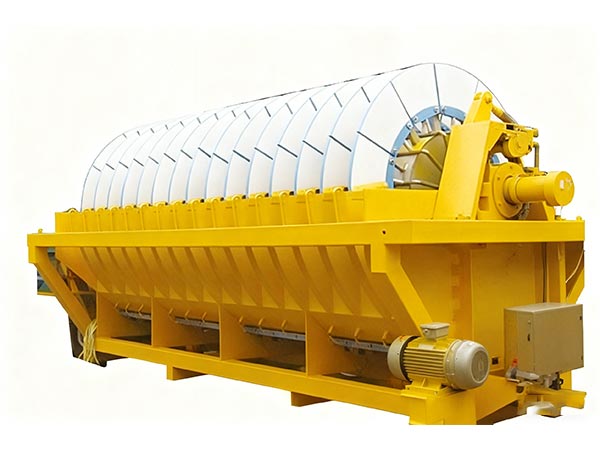The ceramic vacuum filter is an efficient solid-liquid separation device based on the principle of vacuum adsorption. Equipped with a cyclic backwashing and frequency-mixing ultrasonic cleaning system, it can effectively prevent micropore clogging. The filter cake moisture content is as low as 6.5%, saving more than 30% energy compared with traditional equipment. Moreover, it possesses corrosion and wear resistance properties, enabling continuous and stable operation. Widely applied in various fields, it is a core industrial dehydration equipment that integrates efficient separation, energy saving and consumption reduction, and long-term stability.
Technical Advantages
High Efficiency and Energy Savings
Vacuum level reaches -0.095~-0.098MPa. Energy consumption is reduced by over 90% compared to traditional equipment, leading to a significant decrease in operational costs.
Production capacity ranges from 1.9 to 76.0 tons per hour. A single unit's efficiency is equivalent to that of three imported filter presses.
High Filtration Precision
Microporous ceramic plates feature a uniform pore size, capable of withhold particles as small as 0.5μm, ensuring high separation precision and crystal-clear filtrate.
The filter cake has a low moisture content, facilitating subsequent transportation and disposal.
High Degree of Automation
Equipped with a PLC control system, integrated with frequency inverters, pneumatic valves, and other components, enabling automatic filtration, cleaning, and liquid level protection.
Reduces manual operation and lowers labor intensity.
Robust Durability
Ceramic plates are made of alumina, offering excellent corrosion and high-temperature resistance, as well as a long service life.
Supports multiple regeneration methods such as high-temperature/high-pressure cleaning and chemical cleaning, resulting in low maintenance costs.
Superior Environmental Performance
Filtrate can be recycled, minimizing water waste.
No secondary pollution is generated during operation, complying with environmental protection requirements.

APPLICATION AREAS
Mining And Metallurgy
Concentrate Dewatering: Widely used for dewatering concentrates of metallic ores such as iron, copper, gold, lead, and zinc, as well as non-metallic ores like sulfur and phosphorus. It significantly reduces the moisture content of filter cakes and improves resource recovery rates.
Tailings Treatment: Efficiently dewaters tailings, reducing the land occupation of tailings ponds and minimizing environmental pollution risks.
Chemical Lndustry
Oxide Dewatering: Applied in the dewatering process of oxides such as zinc oxide and lead oxide to enhance product purity.
Slag Separation: Achieves solid-liquid separation of electrolytic slag, leaching residue, furnace slag, etc., lowering subsequent processing costs.
Environmental Protectian
Wastewater Treatment: Treats industrial and municipal wastewater. The filtrate, with a solids content of less than 0.005%, can be recycled, reducing emissions.
Sludge Treatment: Dewaters municipal and industrial sludge, reducing its moisture content for easier subsequent disposal.
Other Areas
Titanium Dioxide Production: Enables liquid-solid separation to improve product quality.
Clean Coal Dewatering: Removes moisture from coal slime during the coal washing process, increasing the calorific value of coal.
Application Considerations
Material Compatibility: For materials that are strongly acidic, strongly alkaline, or contain hard, sharp particles, special ceramic filter plates made from materials such as alumina, silicon carbide, or with special coatings are required. If not, the filter plates may be damaged.
Initial Investment: The one-time investment cost for the equipment is typically higher than that of traditional vacuum filters.
Maintenance Requirements: Ceramic filter plates need to be cleaned regularly using ultrasonic or chemical methods to maintain their permeability.
Summary
Ceramic vacuum filter, boasting significant advantages such as high efficiency, energy saving, high filtration precision, and strong automation, have become the core equipment for solid-liquid separation in fields like mining, chemical engineering, environmental protection, and new energy. They not only help enterprises improve resource recovery rates and reduce operational costs but also drive the industry towards green and low-carbon transformation. In the future, with continuous technological innovation and intelligent upgrading, ceramic vacuum disc filters will further break through operating condition limitations, providing efficient and reliable solid-liquid separation solutions for global industrial production with more precise separation capabilities and more stable operational performance.







